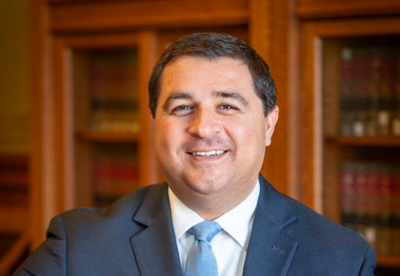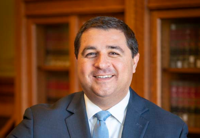
Kaul
MADISON, Wis. - The Wisconsin Supreme Court - a body of divided liberals and conservatives that has drawn the attentions of voters in other states - has unanimously agreed on something: Keep lawmakers out of the attorney general’s hair.
A unanimous Wisconsin Supreme Court on June 17 upheld the power of the state Attorney General’s Office - led currently by Democrat Josh Kaul - to authorize settlements in lawsuits and enforcement actions, rejecting arguments only legislators can authorize matters involving state funds.
The decision trims the oversight of the Republican-controlled legislature under a law it passed in 2018 to limit the power of an incoming Democratic governor and attorney general. Under that law, the state Department of Justice was supposed to obtain the approval of a joint committee of finance before agreeing to any settlements.
“The quintessential core power belonging to the executive branch is the power to `take care that the laws be faithfully executed,’” Justice Brian Hagedorn wrote, and that power includes the discretion to decide when to end certain types of cases.
The unanimous ruling is surprising based on the recent history of the court, which includes two elections that featured millions in out-of-state financial support, were each the most expensive judicial election in American history and resulted and preserved a 4-3 liberal majority.
Not to mention the split decisions that resulted and accusations of a liberal “power grab.” But for at least one key political question, the four liberals and three conservatives were aligned.
Labor groups sued to the block the law immediately after it was passed but the Wisconsin Supreme Court upheld it in 2020, ruling “at least in some cases,” the legislature had the power to intervene in cases “where its institutional interests are implicated.”
After that, the legislature created a settlement checklist to identify when the Joint Finance Committee should be involved. The DOJ refused to use the process, however, and sued the legislature in June 2021, claiming the act violated the constitutional separation of powers when it came to settlements involving environmental or consumer protection laws and the administration of executive-branch agencies.
Dane County Judge Susan M. Crawford -- since elected to the Supreme Court in one of the most expensive judicial elections in U.S. history – ruled for the DOJ in 2022. The state appeals court reversed her, but the Supreme Court ruled for the DOJ in a unanimous opinion dated June 17.
The legislature argued it had an institutional interest in any activity that generates revenue, since the state constitution commands it to levy taxes and balance the budget every two years. Without knowing what settlements the DOJ has approved and how much money they will bring in, legislators, argued, they can’t fulfill their constitutional functions.
“This doesn’t make sense,” Hagedorn said. “While undoubtedly the Legislature would be wise to account for all sources of income when determining the amount to tax in the coming year, it does not follow that the Legislature has a constitutional interest in controlling every executive function involving the collection of revenue, or even taxes.”
The DOJ conceded at the outset it didn’t have the power to authorize settlements where the state pays money to another party. The high court agreed, limiting DOJ’s settlement power to cases where the state sought money in consumer protection and environmental suits or administrative actions.
The court likewise rejected the argument the legislature had an interest in any settlement that implicated policy. Legislators argued the attorney general could authorize a settlement with a landlord that directed millions of dollars into a “preferred housing nonprofit” to build low-income housing.
While such an agreement might conflict with the legislature’s preferences on affordable housing, the court said, it has granted the AG discretion to direct settlement money under current law.
“If the Legislature is dissatisfied with the discretion it left to the Attorney General, it may amend the laws accordingly,” Hagedorn wrote. Legislators have already done so in at least two categories, the court noted, directing all settlement money to go into the general treasury.
Republican legislators were responding to criticism of state attorneys general who have claimed control over settlement funds, such as in opioid litigation, and directed it to favored groups aligned with the Democratic Party. The court emphasized, however, that Wisconsin lawmakers can control that practice if they pass a new law.
Colloquially, the Legislature asserts this was done so that it could have a “seat at the table” in certain settlements of plaintiff-side civil actions. The DOJ asserts that “the Legislature took full veto power” and now sites on a “throne.”
In the two years since liberal Janet Protasiewicz's election gave her side the majority, conservatives have accused the liberal majority of a power grab, tyranny and gutting the people's access to courts.
Conservative justice Rebecca Grassl Bradley has been an outspoken critic, filing dissenting opinions in key cases that accused the liberals of replacing the law with their own ideologies.
In one case, the liberals overturned a decision a then-conservative-led Supreme Court had issued two years earlier. Democrats said the law allows absentee voters to put their votes in ballot drop boxes, rather than return them in the mail or in person.
The decision went against the GOP majority in the legislature, which said the law forbids drop boxes. Democrat Gov. Tony Evers intervened and urged the liberals to overrule the previous ruling, which they did.
"The majority again forsakes the rule of law in an attempt to advance its political agenda," Rebecca Grassl Bradley wrote.
"The majority began this term by tossing the legislative maps adopted by this court... for the sole purpose of facilitating 'the redistribution of political power in the Wisconsin legislature.'
"The majority ends the term by loosening the legislature's regulations governing the privilege of absentee voting in the hopes of tipping the scales in future elections."


